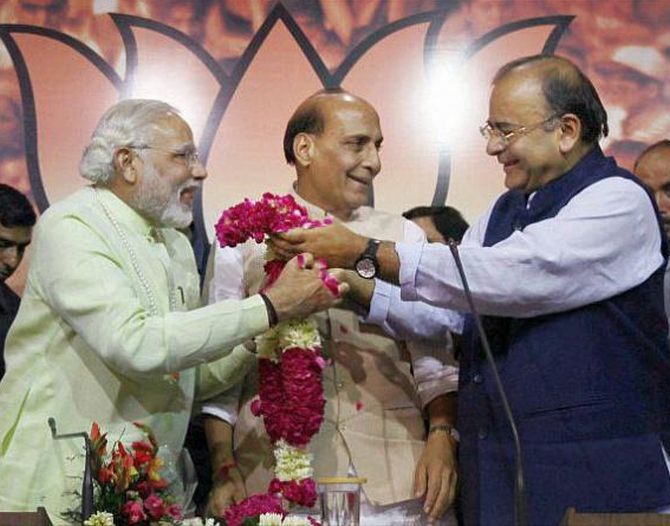
'Modi has the ideas for a new, hopeful India, and an idiom in which to sell optimism to voters.'
'But he doesn't yet have the team for it, and soon enough, questions will begin to be asked by an impatient, non-ideological, I-don't-owe-anybody-anything generation of Indian voters,' says Shekhar Gupta.
A full hall at New Delhi's hallowed intellectual hub, the India International Centre, threw a surprise last fortnight. At the release of his biography of P V Narasimha Rao, author Vinay Sitapati asked his panel, including Pratap Bhanu Mehta, C Raja Mohan, K Natwar Singh and this writer, what skill could Narendra Modi learn from the late prime minister.
I expressed my trepidation to begin with, as in these times, even to suggest that there is any skill the prime minister so lacks that he must learn from somebody else, is reckless. But since silence, or 'pass' wasn't an option, I asked the audience a bunch of questions.
I said, in the summer of 2014, Modi won his great mandate on the promise of a new hope. So could this very well-informed audience tell me the names of some of those manning 'hope' ministries.
I listed agriculture, health, science and technology, rural development, social justice and empowerment. In the hall packed with about 500 smart people, about two per cent -- just 10 hands -- went up for Radha Mohan Singh for agriculture, and that was the highest.
The least, no surprises, was for Birender Singh for rural development -- just about two hands. The rest -- J P Nadda for health, Harsh Vardhan for science and technology, Thawar Chand Gehlot for social justice (a Dalit candidate sometimes mentioned as a likely successor to President Pranab Mukherjee next year, so please do flag his name) -- were somewhere in between.
It would have been no better if I went on with labour and employment (Bandaru Dattatreya, who would be remembered for his Rohith Vemula letters), tribal affairs (Jual Oram) and mines (Narendra Singh Tomar).
Everybody knows Ram Vilas Paswan and Uma Bharti. But what they do in the Union Cabinet? Remember food and water resources?
Let's be fair. Nobody knows most of the ministers in most of our recent Cabinets. I had a favourite ploy walking around my newsroom when the United Progressive Alliance was in power: To ask if anybody knew who was India's water resources minister. Very few would know even in the course of what meteorologists would describe as an epoch of poor monsoons and spreading water distress.
You also mostly remember UPA's health ministers because of the controversies they created: Anbumani Ramadoss versus AIIMS being one. Ghulam Nabi Azad is a titan of the Congress party. But most won't even be conscious that he served as UPA-II's health minister for five years.
UPA-II also had seven forgettable railway ministers in these five years. But the UPA, remember, was finally kicked out of power more rudely than any incumbent in our electoral history.
Health, agriculture, rural development, social justice, water, employment and food are all what we define as today's 'hope' ministries. But can they deliver?
The agriculture minister can talk of little more than 'jaivik kheti' (organic farming) and the magic of cow dung and urine.
Water resources is as dry for ideas and delivery as the last two years' monsoons.
Health would make you wonder if it isn't just an adjunct to Ayush, the real thing.
The rural development minister is looking at power in his home state and the science minister is recovering from the injury of being denied leadership in Delhi (in favour of Kiran Bedi) and then his unceremonious removal from health.
The Modi government is far from being a disaster. There is a robust economic growth in a challenging global environment. There is still no challenge to social coherence or stability in spite of deterioration in Kashmir. But is it ushering in the hope it had promised?
Evidence from successive state elections and the growing traction the Aam Aadmi Party is getting in some poll-bound states would suggest no. Much of this can be blamed on the lack of talent in his government.
Take a close look at what is working: Highways, railways, power, fiscal discipline and bank clean-up, and you can link it directly to the quality of talent leading these ministries.
When Modi came to power two years ago, unburdened of any coalition pressures, it was widely wished that he will reach out to attract the best talent into his government.
That he had the political capital to bring technocrats in his Cabinet, in top bureaucracy, set up special purpose groups and projects headed by empowered talent from 'outside the system.'
Nothing was to stop him from collecting the best available Indian talent irrespective of old ideological affiliations.
In the past many decades, Modi's has been the government most hesitant to embrace non-party talent. Even UPA-II, with all its confusions, brought in Nandan Nilekani and empowered him to deliver Aadhaar which Modi is putting to real use now.
But who is this government's Nilekani and what is its new idea to match Aadhaar?
Indira Gandhi routinely collected talent from the corporate world though whether she made the best use of it or not is a different matter.
Rajiv Gandhi had Sam Pitroda revolutionising telecom. Atal Bihari Vajpayee had R V Shahi as power secretary script reform which is now bearing fruit.
Even V P Singh, a short-term prime minister with tiny political capital compared to any of these listed here, stole Arun Singh from Rajiv Gandhi to take a close look at modernising our defence organisation. His brilliant report is still relevant.
Entrenched bureaucracies grow hyper-immune to 'foreign' elements and a leader has to bring his own power to bear to make them survive. Whatever the 'system's' issues with Raghuram Rajan, it is a failure in this context.
Since we began this with Rao, he was probably our weakest and least popular full-term prime minister. If he is now remembered fondly (sometimes much too fondly) it is because he, limited in talent, popular appeal, lacking majority, detested by his own peers, had the smarts -- and big heart -- to collect talent wherever he could find it.
He invented Manmohan Singh the politician and made him finance minister out of nowhere. His finance secretary, Montek Singh Ahluwalia, was a non-IAS economist and still in his forties. He chose P Chidambaram as his commerce minister and gave crucial internal security to Rajesh Pilot although they were widely seen to be 'Rajiv's boys.'
The reward was a legacy nobody expected him to build.
That is the one skill, attribute, Modi can learn from Rao. He is much bigger, smarter and enormously more popular than Rao.
He also has age on his side, so important as three of our wiser prime ministers, Rao, Vajpayee and Dr Singh got power 10 years too late in their lives and Rajiv Gandhi 10 years too early.
Modi has the ideas for a new, hopeful India, and an idiom in which to sell optimism to voters. But he doesn't yet have the team for it, and soon enough, questions will begin to be asked by an impatient, non-ideological, I-don't-owe-anybody-anything generation of Indian voters.










